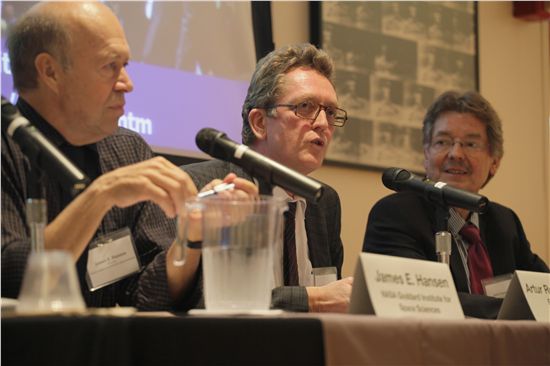Purpose
- Investigates the effect of the global financial system and/or the monetary system in fostering a sustainable economy.
- Investigates causes tending to destroy or impair the free-market system.
- Explores and develops market-based solutions.
Summary
The conference was hosted by The New School on September 22 and 23, 2011. It addressed open questions regarding the transition from high carbon intensive technology to low carbon intensive technology. A particular focus was on renewable energy sources. The workshop brought together high-profile experts from different countries and institutions who made predictions and policy recommendations regarding the potential market outcomes associated with different approaches to organizing the transitional stage.

James Hansen, Arthur Runge-Metzger and Willi Semmler discuss political strategies to implement renewable energy.
Description
Fukushima has once again heavily heated up the debate on the transition to renewable energy. Is green energy the answer to global warming, energy independence, and the prevention of Fukushima-like disasters? If so, will the switch kill jobs and raise taxes? Or will renewable energy create a green recovery? What is the bottom line? On September 23 and 24, The New School hosted an international conference that gathered leading U.S. & E.U. government officials, geoscientists, policy analysts, politicians, business leaders and academics in New York to discuss how transitioning to renewable energy will affect the fragile U.S. and global economies. Panels focused on the future of nuclear power, the reality behind green jobs, the practicality of new technologies, and the tensions between developed and developing countries. The participants included experts such as Ottmar Edenhofer of the Intergovernmetal Panel on Climate Change (IPCC), James Hansen from the NASA Goddard Institute for Space Studies, Peter Schlosser from the Earth Institute at Columbia University, Artur Runge-Metzger from the European Commission and Mark Jacobson from Stanford University.
Given the self-enforcing dynamics of climate change caused by melting poles and changing ocean currents, the projected growth of developed and developing countries and the still abundant availability of fossil fuels, a transition to renewable and carbon-neutral energy sources is of high urgency. To mitigate the warming of the Earth sufficiently, available fossil fuels must not be exploited.
Even though the technology of renewable energy production such as wind, solar, biomass and hydraulic power is still premature—especially the storage of energy as well as the adjustment of demand and supply through grids—technology is developing and improving fast. More widespread use of these technologies will imply economies of scale and reduce the cost of production. Overall, the transition to renewable energy is not really constrained by technology. Rather it is the lack of political ambition, the power of special interest groups, and the current low price of fossil energy sources which, however, does not include the negative externalities generated for the environment. An “honest” price on carbon—implemented through a carbon tax or a cap-and-trade system—would make renewable energy much more competitive even at the current state of technology.
Even though there have been substantial improvements in the safety and efficiency of nuclear plants as well as regarding the issue of waste disposal, Fukushima showed that nuclear power is still extraordinarily risky. Since nuclear fallouts are highly unlikely but still possible and involve huge costs, there is no insurance against this risk. In the case of an accident, the cost is externalized and, therefore, one may argue that the price of nuclear power is too low. Nevertheless, the price of nuclear energy is steadily rising over time due to the never-ending need for improved safety measures.
Since relative costs of energy production are crucial for the transition to renewable energy, it is worth projecting the development of future prices of nuclear and fossil energy and renewable energy. It can be expected that the cost of renewables decrease over time due to economies of scale and technological innovation. At the same time the cost of nuclear power will go up. If one internalizes the externalities of these power sources, their cost would be much higher.
Part of the public skepticism towards the transition to renewable energy and implementing mitigation policies is caused by the fear of net job loss. As studies have shown, however, this fear is unjustified. Public investment in renewable energy is likely to generate high-skilled jobs and a tax on carbon-intensive industries may have positive employment effects if low carbon-intensive industries are subsidized.
Purpose
The conference addressed the question how the transition towards low-carbon intensive technology and "green energy" can effectively help reducing the emission of green house gases, produce sufficient energy supply and contribute to economic stability and employment. We sought to contribute to the debate on how the market economy can be brought on a path consistent with prosperity and sustainability. The conference thus focused on which economic environment is favorable for inducing entrepreneurs to invest in and adopt green technology and green energy. The pros and cons of public investments in green R&D, incentive structures such as carbon taxes and subsidies for low carbon-intensive technology have been discussed in the workshop. We analyzed the question of what weight should be given to different types of greenhouse gas free energy (such as solar, wind, ocean and nuclear power). Solutions have been pointed out to policy makers.
Scope
The workshop featured international experts in the field. Yet, the focus was on what measures the US as the leading economy in the world can pursue in order to become a leader in sustainable economic growth exhibiting high employment generated by considerable private investment in green industries and green energy supply. The target group of the workshop were US academics, officials and policy makers.
Project Link www.newschool.edu/scepa
Amount Approved$25,000.00
on 12/3/2010
(Check sent: 12/13/2010)